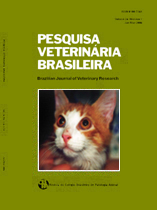 |
|
|
|
Year 2010 - Volume 30, Number 2
|

|
Risk factors and presence of antibodies to Toxoplasma gondii in dogs from the coast of São Paulo State, Brazil, 30(2):161-166
|
ABSTRACT.- Da Silva R.C., Lima V.Y., Tanaka E.M., Da Silva A.V., Souza L.C. & Langoni H. 2010. Risk factors and presence of antibodies to Toxoplasma gondii in dogs from the coast of São Paulo State, Brazil. Pesquisa Veterinária Brasileira 30(2):161-166. Departamento de Higiene Veterinária e Saúde Pública, Faculdade de Medicina Veterinária e Zootecnia, Universidade Estadual Paulista, Distrito de Rubião Júnior s/n, Botucatu, SP 18618-000, Brazil. E-mail: silva_rcd@yahoo.com.br
Toxoplasmosis is caused by the obligate intracellular protozoan parasite Toxoplasma gondii and affects warm-blooded vertebrates, including pets and man. Dogs are epidemio-logically important since they act as sentinels for the infection in humans. The present study aimed to determine the presence of antibodies to T. gondii in 205 serum samples from dogs in Ubatuba, Sao Paulo state, Brazil, through indirect immunofluorescence reaction (IFAT), as well as the risk factors related to toxoplasmosis in the animals such as breed, age, sex, access to outdoors, homemade food ingestion, access to untreated water, and contact with rodents. Toxoplasmosis-positive samples accounted for 52/205 (25.4%), with titers ranging from 16 to 256. The serological results presented significant association (P<0.05) with homemade food ingestion (45/118; 38.1%; CI95% 29.9%-47.2%) (OR=7.0; CI95% 3.0-16.6), and with access to outdoors where those that do not have access to the street were prevalent (37/121; 30.6%; CI95% 23.1%-39.3%) (OR=0.5; CI95% 0.2-1.0). These results show that toxoplasmosis in this region is related to problems of sanitary education, mainly concerning the appropriate cooking of foods, since most positive animals did not show significant association with the presence of rodents or untreated water consumption but showed, instead association with ingestion of homemade food. Thus, toxoplasmosis is a public health problem in the studied region, and sanitary measures are needed to control the infection due to the strict relationship between man and dog and the presented risk factors. |
| |
|
|
| |
|
 |